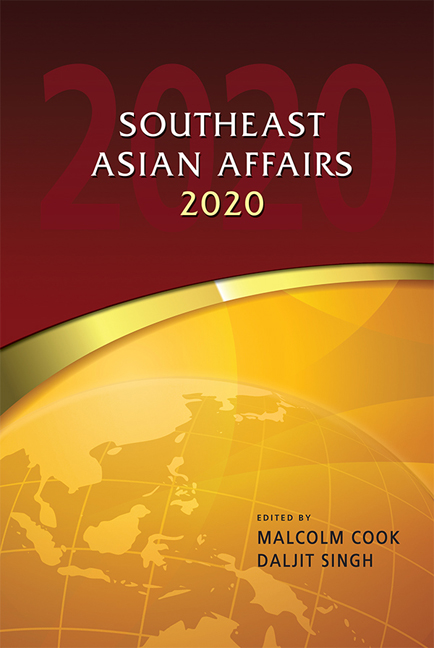Cambodia in 2019: Entrenching One-Party Rule and Asserting National Sovereignty in the Era of Shifting Global Geopolitics
Published online by Cambridge University Press: 24 November 2020
Summary
On 29 December 2018, Prime Minister Hun Sen presided over the inauguration of the Win-Win Monument, constructed on the outskirts of Phnom Penh to commemorate the end of civil war in Cambodia some twenty years ago when the Khmer Rouge was finally defeated in 1998. Achieving total peace is a source of pride for Prime Minister Hun Sen, signalling his triumph over the neoliberal global order, especially since even the United Nations (UN) failed in this task, despite the mission's expensive price tag. The ceremony was also a testimony to the pre-eminence of the ruling Cambodian People's Party (CPP) following the dissolution of the opposition Cambodia National Rescue Party (CNRP) and the party's comprehensive victory in the 2018 general elections that transformed Cambodia into a de facto one-party state. In many ways, Prime Minister Hun Sen and the CPP have reasons to be proud of Cambodia's achievements. The economy continued to expand sustainably at a rate of around seven per cent, elevating Cambodia to one of the fastest-growing economies in the world. Its international geopolitical position has also been strengthened with the political and economic support of China. However, despite these successes, the CPP faces challenges to its legitimacy, both on the international and domestic fronts, as it embarks on further power consolidation. This chapter analyses the CPP's successes and challenges in 2019 in the domains of politics, economics and foreign affairs. The first section will discuss the domestic political developments surrounding Sam Rainsy's attempt to return from self-imposed exile and the reactions of the Cambodian government. The second section will address economic developments in 2019 as well as possible future trends. The third section will discuss Cambodia's external relations, particularly Western concerns over its recent democratic regression and its bilateral relations with China and Vietnam.
Politics
The CPP's electoral victories since the UN-organized elections in 1993 have occurred largely because of the divisions within the opposition camp. The merger between the Sam Rainsy Party and the Human Rights Party into the CNRP had initially posed an electoral challenge to the CPP, as evidenced by the former's strong performance in both rural and urban areas in the 2013 general election and the 2017 local elections.
- Type
- Chapter
- Information
- Southeast Asian Affairs 2020 , pp. 119 - 134Publisher: ISEAS–Yusof Ishak InstitutePrint publication year: 2020



